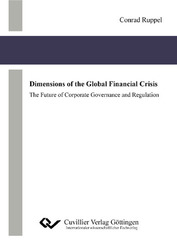| Fachbereiche | |
|---|---|
| Buchreihen (97) |
1382
|
| Nachhaltigkeit |
3
|
| Gesundheitswesen |
1
|
| Geisteswissenschaften |
2372
|
| Medienwissenschaften | 16 |
| Theologie | 57 |
| Philosophie | 102 |
| Rechtswissenschaft | 423 |
| Wirtschaftswissenschaften | 853 |
| Sozialwissenschaften | 417 |
| Sportwissenschaften | 48 |
| Psychologie | 233 |
| Pädagogik | 190 |
| Geschichtswissenschaften | 183 |
| Kunstwissenschaften | 111 |
| Kulturwissenschaften | 166 |
| Literaturwissenschaften | 117 |
| Sprachwissenschaften | 89 |
| Naturwissenschaften |
5408
|
| Ingenieurwissenschaften |
1798
|
| Allgemein |
98
|
|
Leitlinien Unfallchirurgie
5. Auflage bestellen |
|
Erweiterte Suche
Dimensions of the Global Financial Crisis
The Future of Corporate Governance and Regulation
Conrad Ruppel (Autor)Vorschau
Inhaltsverzeichnis, Datei (29 KB)
Leseprobe, Datei (160 KB)
This paper examines corporate governance and regulation in the context of the current global financial crisis at its peak time in 2008/2009.
For the purpose of this study, it is essential to be aware of the market conditions and business models, in which corporate governance and regulation needed to function throughout the last years. Moreover, it is essential to consider the impact of regulation; the financial sector has widely emphasized the rationale of self-regulation, which is generally seen as more cost-effective and preferable to government regulation.
It will be shown that a complex web of interrelated failures in both corporate governance and governmental regulation not only caused, but also prolonged the crisis. Examining the function and weaknesses of corporate governance adds an important perspective to the search for the causes. It reveals the ability of companies (in the financial sector) to effectively use the freedom associated with self-regulation, as it likewise defines an area for possible government regulation in the short and long term. Examining government regulation on a national (US) and international level demonstrates that not only failures in corporate governance, but even more a number of imprudent government regulations were fundamental for the financial debacle. In addition, recent government interventions and draft proposals predict the danger of overregulation and the implementation of further imprudent policies.
In order to discuss the role of self-regulation and government regulation in the context of the global financial crisis, the last chapter establishes a chain of reasoning, which mainly refers to the findings of this paper; it is complemented with considerations regarding the special nature of the financial sector and the future role of government regulation. It is shown that the desired balance does and should not only depend on government regulators; but that stability of firms and markets requires sound corporate governance and self-regulation by companies in the financial sector. This approach involves a number of short and long term recommendations for both governments and companies.
| ISBN-13 (Printausgabe) | 3869552565 |
| ISBN-13 (Printausgabe) | 9783869552569 |
| ISBN-13 (E-Book) | 9783736932562 |
| Sprache | Englisch |
| Seitenanzahl | 108 |
| Auflage | 2 Aufl. |
| Band | 0 |
| Erscheinungsort | Göttingen |
| Erscheinungsdatum | 15.03.2011 |
| Allgemeine Einordnung | Master Theses |
| Fachbereiche |
Rechtswissenschaft
Wirtschaftswissenschaften |








